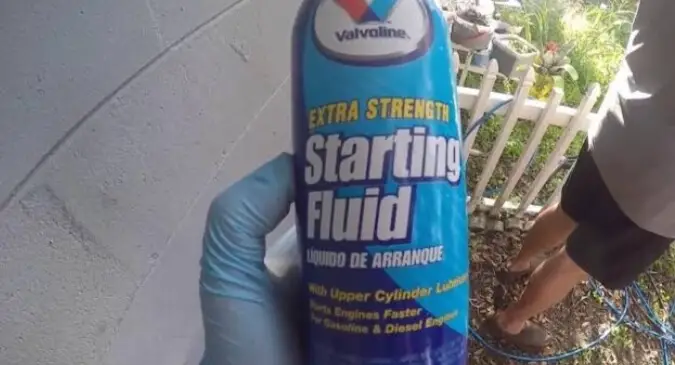As an Amazon Associate, we earn from qualifying purchases. This does not affect the price you pay or the quality of the products you buy. For more information, please read the full affiliate disclosure here.
If you own a diesel engine, you may have wondered if you can use starter fluid to start it in cold weather. Starter fluid is a product that is designed to help ignite an engine quickly and efficiently. It is usually sprayed into the air intake of the engine, where it mixes with the air and creates a highly combustible mixture. Starter fluid can be very useful for starting stubborn engines, especially at low temperatures.
But can you use starter fluid on a diesel engine? The answer is not so simple. Diesel engines are different from gasoline engines in many ways, and they have different requirements and limitations. Using starter fluid on a diesel engine can have some benefits, but also some risks.
In this article, we will explain what starter fluid is, how it works, and what the pros and cons of using it on a diesel engine are. We will also give you some tips on how to use starter fluid safely and effectively on your diesel engine. Let’s get started!
What is starter fluid, and how does it work?

Starter fluid, also known as ether, is a volatile liquid that has a low flash point and a high octane rating. It is commonly used as a solvent, an anesthetic, and a fuel additive. Starter fluid can be found in spray cans or bottles, and it is usually sold in auto parts stores or online.
Starter fluid works by increasing the flammability of the air-fuel mixture in the combustion chamber of the engine. When the engine is cold, the fuel may not vaporize enough to ignite properly. This can cause hard starting, rough idling, or stalling. Starter fluid helps to overcome this problem by providing a more easily ignitable fuel that can start the engine faster and smoother.
To use starter fluid, you need to spray a small amount of it into the air intake of the engine, usually through the air filter or the throttle body. You should do this while the engine is off, and then turn the ignition key to start the engine. The starter fluid will be drawn into the cylinders, where it will mix with the air and the fuel and create a highly explosive mixture that will ignite the engine. You should only use a short burst of starter fluid, as too much can cause damage to the engine or even a fire.
Some of the benefits of using starter fluid on a diesel engine are:
- It can help to start the engine in cold weather, when the glow plugs or the compression may not be enough to ignite the fuel.
- It can help to start the engine after it has been sitting for a long time, when the fuel may have degraded or the injectors may have clogged.
- It can help diagnose engine problems, such as low compression, faulty glow plugs, or bad injectors, by eliminating the fuel system as the cause of the hard starting.
However, using starter fluid on a diesel engine also has some drawbacks, such as:
- It can damage the engine components, such as the pistons, the rings, the valves, or the head gasket, by causing excessive pressure or detonation in the cylinders.
- It can damage the fuel system, such as the injectors, the pump, or the filter, by washing away the lubrication or introducing contaminants.
- It can cause a fire or an explosion if the starter fluid is sprayed near a spark, a flame, or a hot surface, or if the can is punctured or exposed to heat.
RECOMMENDED READ:- Maximize the Life of Your Diesel Generator With Our Expert Engine Oil Guide
How to Use Starter Fluid Safely and Effectively on Your Diesel Engine?
As we have seen, using starter fluid on a diesel engine can have some benefits but also some risks. Therefore, you should use it sparingly and only when necessary. Here are some tips on how to use starter fluid safely and effectively on your diesel engine:
- Before using starter fluid, make sure that your battery is fully charged, your glow plugs are working, and your fuel system is clean and primed. These steps can help you avoid the need for starter fluid in the first place.
- Choose a starter fluid that is compatible with your diesel engine. Some starter fluids are designed for gasoline engines only, and they can damage your diesel engine. Look for a starter fluid that is specifically formulated for diesel engines or that has a label that says “safe for diesel engines.”.
- Follow the directions on the starter fluid can. Different products may have different instructions on how much, how often, and how long to spray the starter fluid. Do not exceed the recommended amount or frequency, as this can cause harm to your engine.
- Spray the starter fluid into the air intake of the engine, not directly into the cylinders. Spraying the starter fluid into the cylinders can cause hydrolock, which is when the liquid prevents the piston from moving. This can bend or break the connecting rods and ruin your engine.
- Spray the starter fluid while the engine is off, and then turn the key to start the engine. Do not spray the starter fluid while the engine is running, as this can cause backfire, which is when the flame travels back into the air intake. This can damage the air filter, the throttle body, or the intake manifold and cause a fire.
- Do not use starter fluid on a hot engine, as this can cause a fire or an explosion. Wait until the engine has cooled down before using starter fluid.
- Do not use starter fluid on a turbocharged or supercharged engine, as this can damage the turbo or the supercharger. These devices increase the air pressure in the engine, and adding starter fluid can create too much pressure and cause a rupture.
- Do not use starter fluid on a direct injection engine, as this can damage the injectors. Direct injection engines inject the fuel directly into the cylinders, and adding starter fluid can interfere with the fuel spray pattern and the injection timing.
- Do not use starter fluid on a common rail engine, as this can damage the high-pressure pump and the injectors. Common rail engines use a high-pressure fuel system that delivers the fuel to the injectors at a constant pressure. Adding starter fluid can cause the pressure to fluctuate and damage the components.
Alternatives to Starter Fluid for Your Diesel Engine
Starter fluid is not the only option for starting your diesel engine in cold weather or after a long period of inactivity. There are other products and methods that you can use to help your diesel engine start easier and faster. Some of these alternatives are:
1. Diesel fuel additives
These are products that you can add to your diesel fuel tank to improve its quality and performance. Some diesel fuel additives can increase the cetane rating of the fuel, which is a measure of how easily the fuel ignites. A higher cetane rating means faster and smoother combustion, which can help your diesel engine start better in cold weather. Some diesel fuel additives can also prevent the fuel from gelling or waxing, which can clog the fuel system and cause hard starting. Some examples of diesel fuel additives are Diesel Kleen, Lucas Fuel Treatment, and Howes Diesel Treat.
2. Diesel fuel heaters
These are devices that you can install in your fuel system to warm up the fuel before it reaches the engine. Diesel fuel heaters can prevent the fuel from gelling or waxing in cold weather and improve fuel atomization and vaporization in the cylinders. This can result in easier and faster ignition and better engine performance. Some examples of diesel fuel heaters are the FASS Fuel Heater, the Arctic Fox Fuel Heater, and Hot Shot’s Secret Diesel Winter Anti-Gel.
3. Engine block heaters
These are devices that you can plug into an electrical outlet to heat up the engine block and the coolant. Engine block heaters can reduce the viscosity of the oil and the fuel and increase the temperature of the engine components. This can improve the lubrication and compression of the engine and make it easier to start in cold weather. Some examples of engine block heaters are Kat’s Engine Heater, Zerostart Engine Heater, and Phillips & Temro Engine Heater.
4. Glow plugs
These are devices that are installed in the cylinders of the diesel engine to heat up the air-fuel mixture before the compression stroke. Glow plugs can help the diesel fuel ignite faster and more efficiently, especially in cold weather or when the engine is cold. Glow plugs are activated by a relay or a controller, and they usually glow for a few seconds before the engine is started. You should always wait for the glow plug indicator light to go off before turning the key to start the engine. Some examples of glow plugs are Bosch Glow Plugs, ACDelco Glow Plugs, and NGK Glow Plugs.
Conclusion: Should You Use Starter Fluid on Your Diesel Engine?
Yes you can use starter fluid on your diesel engine. Starter fluid is a product that can help you start your diesel engine in cold weather or after a long period of inactivity. It works by increasing the flammability of the air-fuel mixture in the cylinders and creating a more easily ignitable fuel that can start the engine faster and smoother.
However, using starter fluid on a diesel engine also has some drawbacks, such as damaging the engine components, the fuel system, or causing a fire or an explosion. Therefore, you should use starter fluid sparingly and only as a last resort. You should always follow the instructions on the product label and the manufacturer’s recommendations for your engine. You should also wear protective gloves, goggles, and clothing and work in a well-ventilated area away from any sources of ignition.
Alternatively, you can use other products and methods to help your diesel engine start easier and faster, such as diesel fuel additives, diesel fuel heaters, engine block heaters, or glow plugs. These products and methods can improve the quality and performance of the fuel and the engine and make it easier to start in cold weather or when the engine is cold. They can also avoid the potential risks of using starter fluid and extend the life and performance of your diesel engine.
🔌 Generator Tools & Social Hub
Maximize your generator knowledge! Use our calculators and join our community for expert tips:
Stay connected for updates and exclusive content:
📘 Facebook Page 🐦 X (Twitter) 📌 Pinterest 🔒 Private Facebook GroupDiscover more from Generator Hacks
Subscribe to get the latest posts sent to your email.


